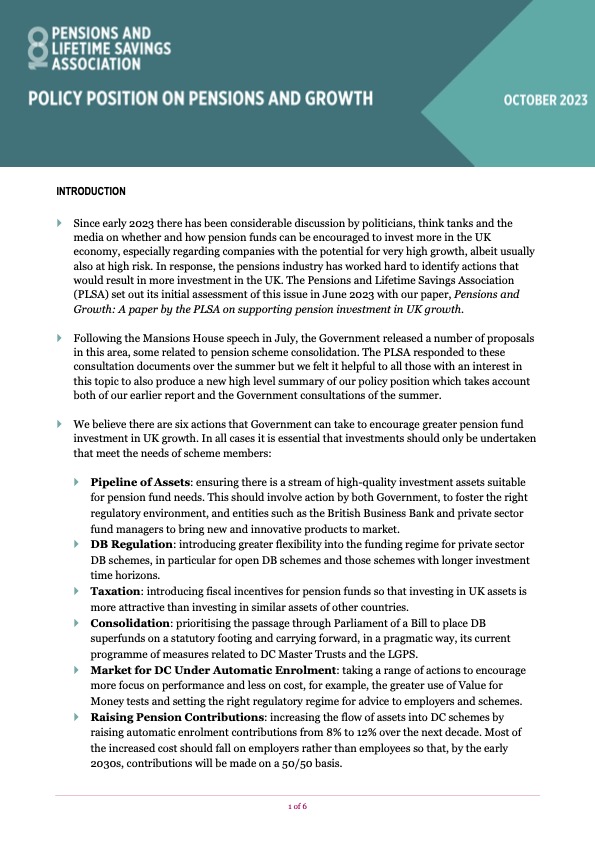PLSA policy position on pensions & growth – October 2023

Since early 2023 there has been considerable discussion by politicians, think tanks and the media on whether and how pension funds can be encouraged to invest more in the UK economy, especially regarding companies with the potential for very high growth, albeit usually also at high risk. In response, the pensions industry has worked hard to identify actions that would result in more investment in the UK. The PLSA set out its initial assessment of this issue in June 2023 with our paper, “Pensions & Growth: A paper by the PLSA on supporting pension investment in UK growth”.
Following the Mansions House speech in July, the Government released a number of proposals in this area, some related to pension scheme consolidation. The PLSA responded to these consultation documents over the summer but we felt it helpful to all those with an interest in this topic to also produce a new high level summary of our policy position which takes account both of our earlier report and the Government consultations of the summer.
We believe there are six actions that Government can take to encourage greater pension fund investment in UK growth. In all cases it is essential that investments should only be undertaken that meet the needs of scheme members:
- Pipeline of Assets: ensuring there is a stream of high-quality investment assets suitable for pension fund needs. This should involve action by both Government, to foster the right regulatory environment, and entities such as the British Business Bank and private sector fund managers to bring new and innovative products to market.
- DB Regulation: introducing greater flexibility into the funding regime for private sector DB schemes, in particular for open DB schemes and those schemes with longer investment time horizons.
- Taxation: introducing fiscal incentives for pension funds so that investing in UK assets is more attractive than investing in similar assets of other countries.
- Consolidation: prioritising the passage through Parliament of a Bill to place DB superfunds on a statutory footing and carrying forward, in a pragmatic way, its current programme of measures related to DC Master Trusts and the LGPS.
- Market for DC Under Automatic Enrolment: taking a range of actions to encourage more focus on performance and less on cost, for example, the greater use of Value for Money tests and setting the right regulatory regime for advice to employers and schemes.
- Raising Pension Contributions: increasing the flow of assets into DC schemes by raising automatic enrolment contributions from 8% to 12% over the next decade. Most of the increased cost should fall on employers rather than employees so that, by the early 2030s, contributions will be made on a 50/50 basis.